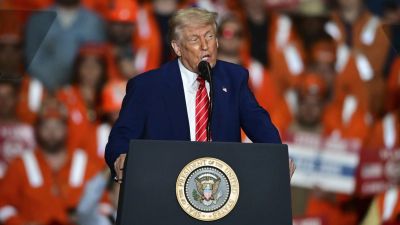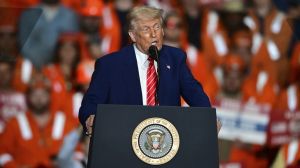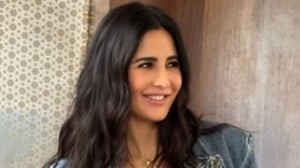In New Delhi, Chavez scores for revolution
The Revolution came to JNU today, riding on a Mercedes-laden Caravan from Caracas. Venezuela’s President Hugo Chavez Frias, pin-up boy ...

The Revolution came to JNU today, riding on a Mercedes-laden Caravan from Caracas. Venezuela’s President Hugo Chavez Frias, pin-up boy of the New Left and something of an Arundhati Roy of the diplomatic circuit, was among friends at the city’s Jawaharlal Nehru University this afternoon.
As he spoke (in Spanish, with a translator around to render the Message into English), Chavez was enthusiastically greeted by a bevy of fellow travellers. They included economists Jayati Ghosh, Abhijit Sen and Prabhat Patnaik, historian Mridula Mukherjee, CPI(M) functionaries Prakash and Brinda Karat (appropriately, in a red cap), and an assortment of left-leaning intellectuals usually seen on late-night news channel debates, frowning upon ‘‘foreigners’’ in the Planning Commission. It was the students, however, who stole the visitor’s heart. Amid SFI posters —‘‘Welcome Chavez, Welcome Revolution’’; ‘‘Oppose IMF, Support Chavez’’—and chants of ‘‘One solution: Revolution’’, Chavez joked, smiled, cheered, attacked (mostly the enemy to ‘‘the North’’, but also capitalism, colonialism, imperialism, neo-imperialism).
The loudest cheers came when he alluded to icons of long ago. ‘‘Since when hasn’t Fidel (Castro) come to India? Invite him,’’ demanded Chavez to thunderous applause. Venezuela, which has the Western hemisphere largest oil reserves, supplies Cuba cheap petrol. In return, Havana has exported hundreds of ‘‘sports instructors’’ to Caracas. Opponents say these are recruits for a Chavez militia, the ‘‘Bolivarian Circles’’.
Few non-Venezuelan audiences could have given Chavez the hearing JNU did, as he evoked Che Geuvara and Jose Marti, quoted Trotsky, denounced ‘‘private ownership of the means of production’’ and announced, with a straight face, that Venezuela ‘‘is in the midst of a revolution, sister of the revolution in Cuba … (This is) a project that transcends the frontiers of Venezuela’’.
Despite his commitment to revolution, Chavez, as it happens, was elected to power in 1998. In 1999, he drafted a new constitution, announced the ‘‘Fifth Republic’’ and was re-elected president under the new laws in 2000.
For Washington, Chavez is the backyard bugbear. In 2002, a military coup against him was defeated by ‘‘the people’’. Chavez described it to JNU as a ‘‘counter-revolutionary’’ attempt by the ‘‘Venezuelan oligarchy with their American masters’’.
As an army officer in 1992, Chavez had himself led a classic Latin American colonels’ coup. It got him two years in prison. Introducing Chavez today, a speaker described that 1992 putsch as a move by ‘‘idealistic army officers who intervened directly in the political malaise’’.
Having opposed the war against the Taliban post-9/11, accepted a human rights award from Libya, shrunk his country’s economy by 15 per cent in two years (an achievement, given rising oil prices), Chavez also finds time to edit a government newspaper. His wife is the publisher.
Sharing the dais with Foreign Minister K Natwar Singh and JNU Chancellor Karan Singh, Chavez was critical enough of America to gladden those nostalgic for the Soviet Union. ‘‘The Bolivarian Revolution has opened its arms to India,’’ he said, adding, ‘‘we want to sell it oil.’’
Certainly India’s most singular state guest in a long time, Chavez travels to Kolkata from the capital. His visit is already causing some commotion in that city, since the Left Front government, keen to provide a rapturous welcome, has attempted to clear slums to beautify Kolkata for Chavez. The measure has been denounced as ‘‘anti-people’’ and stymied by the CPI(M)’s local opponent, the Trinamool Congress.






- 01
- 02
- 03
- 04
- 05

























